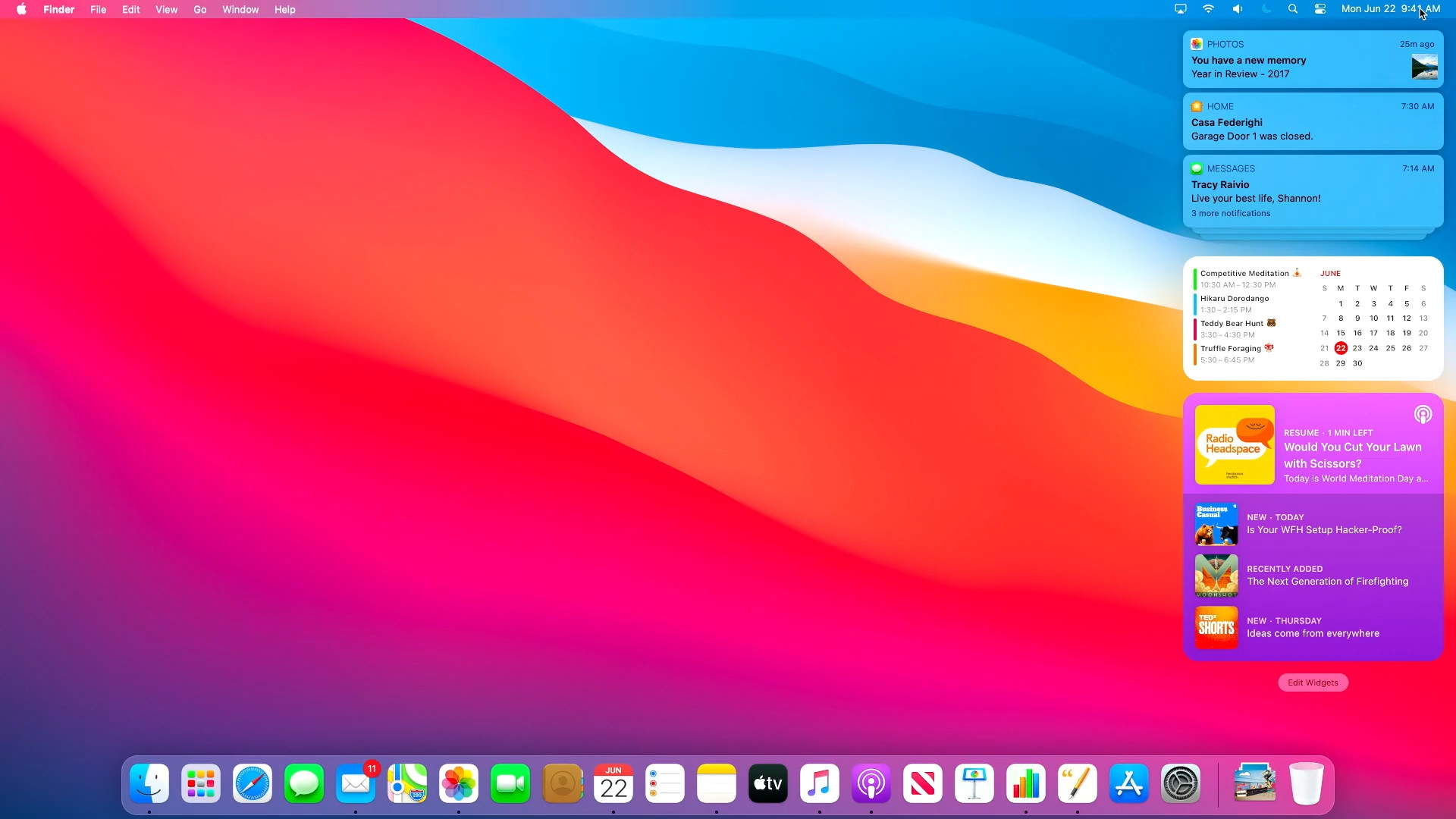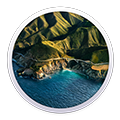On November 12th 2020, Apple released macOS Big Sur for both Intel and Apple Silicon Macs, after having been announced June 22nd the same year at WWDC 2020.. This version of macOS is named after the coastal region of Big Sur in the central Californian coast, continuing the theme of California named locations started way back in 2013 with Mavericks.
It was the first version of macOS to ship with Apple Silicon Macs, featured a complete design overhaul, and was the last version to officially support any Nvidia GPUs. To be specific, this version of macOS is the second to drop support for a major set of Nvidia drivers – after in Mojave 10.14 Apple dropped support for all Pascal/Maxwell Nvidia GPUs.
Also for the first time since the release of Mac OS X 10.0 Cheetah, the numerical version now starts with a a digit higher in the hundredths place – version 11. This was done on purpose to mark the introduction of Apple Silicon Macs, and is the first time since the 90s “Mac” operating system versions were differentiated using digits in the ones place. To maintain backwards compatibility, macOS Big Sur shows up as macOS 10.16 in the browser and to old software.
 (Tap to zoom in on above)
(Tap to zoom in on above)
Intended to feel familiar while sporting a totally different look, Big Sur further iterated on the iOS-like design iterations first introduced in Yosemite. Yosemite brought a “flatter” iOS 7 design, and Big Sur brings some visual hierarchy through blurs and item placement visual effects. There’s an entirely new color palette, new icons, wallpapers, and a more square shaped icon set that are distinctly more round.
Carrying over from the iOS line up is control center – a way to quickly turn on/off bluetooth, wifi, brightness, sound, etc, the Notification Center is redesigned, Time Machine has beeb overhauled and refined, Spotlight is now faster and more deeply integrated in the system, the core OS is now cryptographically signed, background updates can start on their own before a restart, and now macOS supports encryption at the file level.
Safari has improved performance and energy consumption with new privacy notifications, a more customizable Home Screen, an on-system translation service, and more. Messages now have group tracking, group photos, inline replies, pinned convos, better Memoji, hashtags and sticker searching. Maps gains a slew of new features including indoor maps, 3D look-around, and trip planning tools.
Safari Extensions now have their own space in the App Store, HomeKit, recognizes faces better, Siri has better website integration, software updates are more in the background, and the startup chime has been re-enabled (and changed to a slightly lower tone). This is the first version of macOS to allow you to turn on/off the startup chime from system prefs, and now there’s USB 4 support.
Why The Startup Chime Changed
Some will notice how the Mac startup chime has changed when upgrading to macOS Big Sur 11.0, playing a lower note than what Macs have been playing (mostly) by default since the Macintosh Centris in 1993. While some have speculated this was an intended change, the reality is actually quite different. DosDude1 explains it best:
“The reason for the different sounding chime on the 2018 models (and later) is actually not intentional by design. It is actually a side effect of the (extremely poorly executed) implementation of the useless T2 “security” chip. It actually handles part of the audio circuitry for some reason (poor implementation, as I said), and is what causes that different sound. Because the sound plays so early in the boot process (and Apple never really intended these machines to have a boot chime in the first place), the T2 is in some weird state causing the audio to become distorted.”
What You Need To Know
- Finder can still download driver updates to sync with newer devices.
- Last official support for Late 2013 15″ MacBook Pro and Mid-2014 15″ MacBook Pro.
- Safari 14 totally removes Adobe Flash Player support
. - DO NOT DOWNLOAD OR USE 11.0.1 (build 20B29) Initial release under any circumstances not even to piggyback off of and update from. This build is known to brick 2013/2014 MacBook Pros, some 2019 MacBook Pros, and 2019 iMacs. (See more)
. - When upgrading from 10.13 High Sierra, 10.14 Mojave or 10.15 Catalina, the upgrade process may stall and get stuck. Users say only a full system restore can fix this, and it’s always recommended you backup your data before updating. This issue was remedied using the 11.6.2 “full installer”.
System Requirements
 There is a comprehensive list available on Apple’s website, but it is also available below. Below is a list of the oldest models supported by Big Sur. Although no RAM amount is specified as a requirement, we recommend you run with at least 16 GB of RAM instead of 8 GB for smooth operation. 8 GB will get you by and get the computer to boot the OS. It is also strongly recommended to avoid running this OS off of a hard drive as it would be quite slow – if your Mac shipped with a hard drive and it is at all possible to swap for an SSD, do it.
There is a comprehensive list available on Apple’s website, but it is also available below. Below is a list of the oldest models supported by Big Sur. Although no RAM amount is specified as a requirement, we recommend you run with at least 16 GB of RAM instead of 8 GB for smooth operation. 8 GB will get you by and get the computer to boot the OS. It is also strongly recommended to avoid running this OS off of a hard drive as it would be quite slow – if your Mac shipped with a hard drive and it is at all possible to swap for an SSD, do it.
- MacBook: 2015
- MacBook Pro: Late 2013
- MacBook Air: 2013
- iMac: 2014
- Mac mini: 2014
- Mac Studio: N/A
- Mac Pro: 2013
Versions
- 11.0 (build 20A2411), Darwin 20.1.0, November 17th, 2020
- Pre-installed on the earliest M1 Macs. Despite being a slightly earlier revision of macOS, this was released later than the 11.0.1 Public Release.
.
- Pre-installed on the earliest M1 Macs. Despite being a slightly earlier revision of macOS, this was released later than the 11.0.1 Public Release.
- 11.0.1 (build 20B29), Darwin 20.1.0, November 12th, 2020
- Initial Public Release. DO NOT DOWNLOAD OR USE, this build is known to brick 2013/2014 MacBook Pros, some 2019 MacBook Pros, and 2019 iMacs. (See more)
.
- Initial Public Release. DO NOT DOWNLOAD OR USE, this build is known to brick 2013/2014 MacBook Pros, some 2019 MacBook Pros, and 2019 iMacs. (See more)
- 11.0.1 (build 20B50), Darwin 20.1.0, November 19th, 2020
- Security updates and bug fix.
.
- Security updates and bug fix.
- 11.1 (build 20C69), Darwin 20.2.0, December 14th, 2020
- Added support for AirPods Max, TV app enhancements, Apple News widgets, and App Store privacy information.
.
- Added support for AirPods Max, TV app enhancements, Apple News widgets, and App Store privacy information.
- 11.2 (build 20D64), Darwin 20.3.0, February 1st, 2021
- Bug fixes, including improved Bluetooth reliability.
- 11.2.1 (build 20D74), Darwin 20.3.0, February 9th, 2021 (Security Update)
- 11.2.1 (build 20D75), Darwin 20.3.0, February 15th, 2021 (Security Update)
- 11.2.2 (build 20D80), Darwin 20.3.0, February 25th, 2021 (Security Update)
- 11.2.3 (build 20D91), Darwin 20.3.0, March 8th, 2021 (Security Update)
.
- Bug fixes, including improved Bluetooth reliability.
- 11.3 (build 20E232), Darwin 20.4.0, April 26th, 2021
- Added support for AirTag, includes improvements for running iPhone and iPad apps on Macs with Apple M1 processors.
- 11.3.1 (build 20E241), Darwin 20.4.0, May 3rd, 2021
.
- 11.3.1 (build 20E241), Darwin 20.4.0, May 3rd, 2021
- Added support for AirTag, includes improvements for running iPhone and iPad apps on Macs with Apple M1 processors.
- 11.4 (build 20F71), Darwin 20.5.0, May 24th, 2021
- Added support for Apple Podcasts subscriptions and channels, and includes bug fixes.
.
- Added support for Apple Podcasts subscriptions and channels, and includes bug fixes.
- 11.5 (build 20G71), Darwin 20.6.0, July 21st, 2021
- Added a Library tab to Apple Podcasts to choose to see followed programs.
- 11.5.1 (build 20G80), Darwin 20.6.0, July 26th, 2021 (Security Update)
- 11.5.2 (build 20G95), Darwin 20.6.0, August 11th, 2021 (Bug Fix)
.
- Added a Library tab to Apple Podcasts to choose to see followed programs.
- 11.6 (build 20G165), Darwin 20.6.0, September 26th, 2021 (Security Update)
- 11.6.1 (build 20G224), Darwin 20.6.0, October 25th, 2021 (Security Update)
- 11.6.2 (build 20G314), Darwin 20.6.0, December 13th, 2021 (Security Update)
- 11.6.3 (build 20G415), Darwin 20.6.0, January 26th, 2022 (Security Update)
- 11.6.4 (build 20G417), Darwin 20.6.0, February 14th, 2022 (Security Update)
- 11.6.5 (build 20G527), Darwin 20.6.0, March 14th, 2022 (Security Update)
- 11.6.6 (build 20G624), Darwin 20.6.0, May 16th, 2022 (Security Update)
- 11.6.7 (build 20G630), Darwin 20.6.0, June 9th, 2022
- Bug fixes, including the opening of email attachments. (11.6.7)
- 11.6.8 (build 20G730), Darwin 20.6.0, July 20th, 2022 (Security Update)
.
- 11.7 (build 20G817), Darwin 20.6.0, September 12th, 2022 (Security Update)
- 11.7.1 (build 20G918), Darwin 20.6.0, October 24th, 2022 (Security Update)
- 11.7.2 (build 20G1020), Darwin 20.6.0, December 13th, 2022 (Security Update)
- 11.7.3 (build 20G1116), Darwin 20.6.0, January 23rd, 2023 (Security Update)
- 11.7.4 (build 20G1120), Darwin 20.6.0, February 15th, 2023 (Security Update)
- 11.7.5 (build 20G1225), Darwin 20.6.0, March 27th, 2023 (Security Update)
- 11.7.6 (build 20G1231), Darwin 20.6.0, April 10th, 2023 (Security Update)
- 11.7.7 (build 20G1345), Darwin 20.6.0, May 18th, 2023 (Security Update)
- 11.7.8 (build 20G1351), Darwin 20.6.0, June 21st, 2023 (Security Update)
- 11.7.9 (build 20G1426), Darwin 20.6.0, July 24th, 2023 (Security Update)
- 11.7.10 (build 20G1427), Darwin 20.6.0, September 11th, 2023 (Security Update, current version)
Unsupported Macs
OpenCore is a boot loader used to inject and patch data in memory, instead of on disk. This allows for a near-native experience on unsupported Macs, and allows macOS Big Sur to be installed on Macs which otherwise couldn’t run it. There are some caveats to running an OS on an unsupported Mac, but the team of people over at OCLP are hard at work to make sure everything runs smoothly! There are some things you should know before you decide whether or not OCLP is right for you: See OpenCore website. for Big Sur.
- There are legacy Metal and non-metal graphics drivers in OCLP and this will determine in part your user experience.

